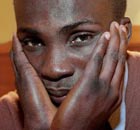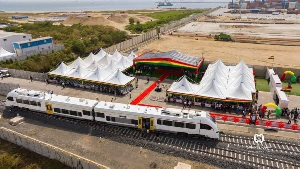Cruellest Voyage
In 1992, Kingsley Ofosu fled poverty in Ghana for the promised land of Europe. But the journey had barely begun when he witnessed the callous murder of his fellow stowaways. He escaped, and an article in the Guardian brought his story to the attention of the world. Hollywood and fame followed, but now he is back in Ghana, living in poverty again. Nick Davies, who wrote the original story, visits him in Accra and hears how it all went wrong Nick Davies Monday December 03 2007 The Guardian'I don't want my son to live the same life I have led. I don't want my family to suffer. We are all in the same world. Some people are suffering and some people are enjoying and I don't know the reason why."
That was the final paragraph of a story that I wrote for the Guardian nearly 14 years ago - the words of Kingsley Ofosu, a 23-year-old Ghanaian who had just endured a terrifying ordeal.
In search of a solution to his young family's poverty in Ghana, he had stowed away on a cargo ship with his brother and six friends. On board, they found a ninth stowaway, who had crept on to the ship in Cameroon. Six days later, on the high seas, they were discovered by the crew, who were afraid that they would lose their jobs if they arrived in Europe with the migrants. And so, after locking them in a tiny, dark storage room for three days, the seamen set about murdering the would-be migrants.
Ofosu was the only survivor. As he watched his brother Albert being shot and tossed over the side to join the seven other corpses in the churning sea, he managed to escape from the crew. For three days, he hid in the dark rafters of the hold as the seamen searched for him.
Finally, the ship put in to Le Havre to unload some of its cargo of cocoa beans. With extraordinary resourcefulness, he not only found his way out of the locked hold by shinning up a ventilation shaft but had the foresight to break open a sack of cocoa beans and plant his Ghanaian identity card deep among them to prove that his unbelievable story was true.
Several months later, I found him in the French equivalent of a Salvation Army hostel in Le Havre, awaiting the trial of the six crewmen - who had been arrested by the town's police - worrying about his family back in Ghana, struggling, because of his lack of French, with simple problems, and in effect homeless and penniless.
"I want my money," he said.
"It doesn't work like that," said the guard, turning him away. Twelve years after the compensation order, he has still not received his €100,000. He also believed he was owed more money by Union Pictures. They had agreed to pay him 1.5% of the production budget for the film. The cheque for $67,500 that they had given him in Ghana was based on the best available estimate of that budget, but Ofosu had since heard from one of those involved that the real budget could have turned out to be much higher. They had also agreed to pay him 10% of the net profits from the film. He had seen none of this. He hired a lawyer in Paris, who wrote to Union Pictures, pointing out that his contract gave Ofosu the right to an independent audit of the film's accounts and asking for the figures so that any final payments could be made. Union Pictures wrote back to say they didn't have the figures. The film had been funded by the BBC and the American cable channel HBO, and neither had sent them reports on costs and sales: "Please be assured that we are doing our best to extract the information from both the BBC and HBO." Months passed. Years passed. Kingsley heard nothing more. He wrote to the BBC and to HBO. They wrote back - without the information he needed. Twelve years after the production of Deadly Voyage, he has still not received the information to which his contract entitles him, nor has he received any further payment that he may be owed. In 2004, struggling from one low-paid job to another, he decided to gamble everything in a final attempt to build a life in Europe. He realised that he could buy second-hand electrical goods in France very cheaply and sell them in Ghana for something like five times the amount. So he spent the last remains of his film money and the little he had saved from his work on filling a shipping container with old television sets, computers, video players and fridges, sent them to Ghana and succeeded in selling them for a healthy profit. Encouraged, he set out to do the same again, this time filling six containers with second-hand clothes and shoes as well as electrical goods. It proved to be a disaster. Ofosu put everything he had into filling the containers. A friend in Ghana came in as his partner, undertaking to pay for the import duties and harbour costs. At the last moment, the partner pulled out. The containers were marooned at the port of Tema, just outside Accra, and Ofosu couldn't afford to get them out. With each passing day, the cost of harbour storage rose alarmingly. He asked friends for money, but they had none. He wrote to the only wealthy people he knew - his old friends at Union Pictures and HBO, who had once been willing to pay for private jets and limousines for him - but they declined to help. Eventually, he found a businesswoman in Accra who agreed to pay the harbour dues and recoup her investment from the sale of the goods. She and Kingsley signed a legal agreement, but then it turned out that she couldn't afford the harbour bill. After months of delay, she paid for just two of the six containers to be released, sold the contents and then told Kingsley she had managed to earn less than a quarter of what he had expected. Aghast, he persuaded her to sign a new agreement, allowing him to sell the remaining four containers himself on the condition that he used the income to pay her the balance of what she claimed she was still owed. He found two dealers who agreed to pay for two more containers to be released from the port. They then vanished with the contents, informing his mother that they would come back and do her serious damage if Ofosu tried to find them. And the businesswoman went to the police, alleging that he had stolen the containers and breached her agreement with him. He spent 30 days in a police cell before he got bail and is waiting for the case to come to court. In the meantime, the remaining two containers have sat so long in the port that they have been seized by the government. Now he has nothing. I tried to intervene with Union Pictures. To make matters more complicated, the company has gone bankrupt, but its former head, Bradley Adams, alerted to this story, has sent a series of messages to the BBC and HBO urgently requesting their costs and sales reports. So far, neither company has delivered. A few years ago, on a trip to Ghana, Ofosu was approached by a young man who told him he was thinking of stowing away on a ship to go to Europe. Ofosu recalls telling him: "My brother, let me tell you something. Everybody hates enemies, but I do not advise even my enemies to stow away. It's very, very dangerous. In Europe, what you think is there, is not like that. It's not the place we thought. Life is hard." The rich man's world is well-defended, with its complex bureaucracy, its harsh limits on state benefits for migrants, its lack of the kind of family loyalties that still work as a safety net in a country like Ghana, its casual racism and its infamous "carrier liability" laws that first inspired the crew to murder Ofosu's fellow stowaways to avoid the repercussions of the fine that would have been imposed on the ship's owner if they had allowed them to reach Europe alive. Ofosu and I sit outside his flat, with his wife and his four children, including Nick, now 12, who is clearly amazed at this strange Englishman whose name he shares. Over and over again, Ofosu's conversation returns to that same anxiety which troubled him when I first met him - this family of his and their uncertain future. And when he asks himself the question, he still can't think of any good reason why some people are suffering and some people are enjoying, even though we all live in the same world. Nick Davies visits Kingsley Ofosu in Accra, is on BBC Radio 4 tonight at 8pm.

















